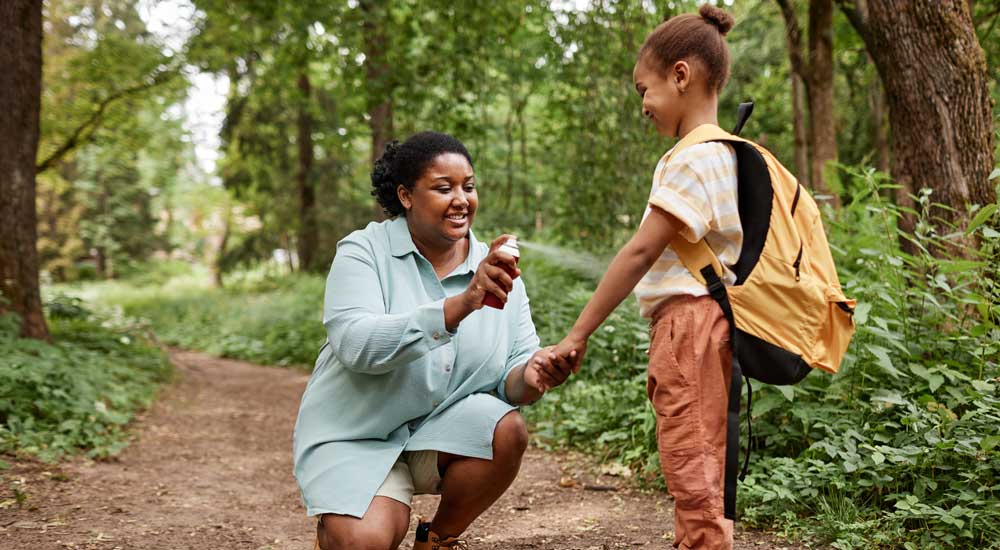Back-to-School Health Tips for Parents
Aug. 3, 2023

Students head back to schools across the state this month. But parents can make sure their children have a healthy school year before the school bell rings.
Dr. Derick Wenning, assistant vice president of medical affairs at BlueCross BlueShield of South Carolina, is a specialist in pediatric emergency care. He offers his insight for parents this school year.
What is the first thing parents should do to keep their kids healthy this school year?
It is hard to pick just one. Injury prevention would be the most important thing to me because accidental injuries are the most common reason children die. The three most common of these are car crashes, drownings and firearm injuries.
Make sure your children are properly restrained in vehicles. Practice pool and water safety. Get your children swimming lessons. If you have guns in your house, make sure they are safely stored, locked away and are not loaded.
Has anything changed with vaccines?
There have been a couple of updates for vaccines. Vaccine recommendations vary from child to child. The most important thing is for parents to discuss vaccines with their child’s doctor. Children as young as 6 months can get a COVID-19 vaccine along with recommended childhood vaccines.
Vaccines prevent serious illnesses like measles, mumps and chickenpox. The Centers for Disease Control and Prevention (CDC) recommends everyone get a flu shot each year. A flu shot decreases the course of the illness and makes it much less severe. The younger the child, the more severe the illness they can have. Getting a flu shot also protects older grandparents or caregivers who may spend time with your child.
What advice do you have for parents around proper nutrition for kids?
As the father of a picky child, I know it can be tough to make sure children get good nutrition. One thing I recommend is to give them good source of necessary vitamins and minerals with a multi-vitamin supplement. Children can be deficient in vitamin D and calcium in their diet. They need both for strong bones and children with deficiencies can have an increased risk of breaking a bone. Make healthy foods a priority. Serve them whole grains, low-fat dairy products and good proteins over highly processed foods and sugary beverages. Recent studies show that good nutrition improves physical health and mental health.
About 10 percent of children’s caloric intake comes from sugary beverages. If you add the empty calories that come from processed foods, it goes up to as high as 40 percent. We are diagnosing adult-type conditions in children, such as high blood pressure and diabetes. Children need good nutrition from whole grains and foods low in fat and high in protein. Replace sugary beverages with water.
How much activity should kids get?
School-age children should be doing physical activity for at least 60 minutes a day. If you can’t get 60, try to get a minimum of 30 minutes. It helps increase their metabolism and improve their overall weight balance. (Find a good family hike with easy trails across the state.)
It is hot in South Carolina. What can parents do to keep their kids safe outside?
Extreme heat is incredibly dangerous for children who are playing outside, specifically for older athletes. They should be taking breaks about every 20 to 30 minutes for water. Seeking shade and staying hydrated are vital. We should all understand the warning signs of heat-related illness. If you get too hot and stop sweating, that is a problem. If you feel confused, dizzy or lightheaded, stop and seek a cool shelter right away.
How much water should kids drink?
Kids do not drink enough water. The amount they need changes based on the age of the child. School-age children should drink between 30 to 40 ounces, or 3 – 5 cups, of water every day. High school-age kids should drink 64 ounces, or 8 cups, of water every day.
Should parents limit screen time?
Yes. Limiting screen time is important. Recommendations are based on age. I would also add that it depends on the content. Good content is more important than how long the child has screen time.
Children under the age of 2 should have no screen time, except for FaceTiming grandparents or far-away relatives. That should be the limit of their screen time. Children ages 2 to 5 should be limited to about an hour a day of high-quality educational materials. Children over 6 should be limited to two hours per day. But again, quality over quantity.
Parents, set a good example by putting your phone down when you tell your child to put his or her device down.
Why is it important to limit screen time?
It's important that we limit screen time for several reasons. One is overall health and improved attention span. Studies show children who have less screen time perform better in school. For older children, research shows links between social media and mental health conditions.
Anything else parents should know to have a healthy school year?
A routine is important. Get your kids back into a good routine, including a good sleep schedule. Sleep is key to overall health and success in school. The CDC recommends a minimum of nine hours of sleep for elementary school-age children.
Some of these links lead to third party websites. Those parties are solely responsible for the contents and privacy policies of their sites.
The CDC is an independent organization that offers health information you may find helpful.
Related Reading
 Summer Safety Guide
Summer Safety Guide
Summer should be full of fun. Take precautions this summer to prevent accidents and keep everyone safe. Here are seven tips for a safe summer.
Read More Build Better Sleep for Improved Health
Build Better Sleep for Improved Health
Getting enough sleep is one thing you can do to improve your overall health. Yet many Americans are not clocking enough sleep in their daily routines. We share some ways to get better sleep.
Read More 6 SC Trails for the Family
6 SC Trails for the Family
It is the perfect time to get outside for a hike as spring arrives in the Palmetto State. If you’re not an experienced hiker, you can still get outside for a walk in nature. Across the state, plenty of trails are welcoming for beginners.
Read More


















